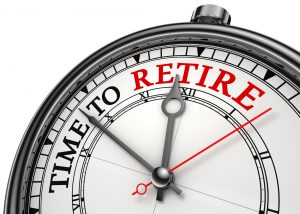Will Wave Of Early Retirements Caused By Swollen Investment Accounts & Pandemic Fatigue Affect Lawyers?
Can the notably stubborn legal profession maintain its legendary obstinance in the face of sweeping demographic change?

(Image via Getty)
Burnout takes a heavy toll on lawyers. It is well known among practitioners that out of every swarm of new associates hired at any given firm, only a handful will ever last long enough to become equity partners. Some of the dropouts from Biglaw transition into less demanding legal roles, although many leave the profession itself behind too. One recent survey out of Florida (although wouldn’t just being in Florida add an extra level of stress for anyone?) found that close to 60 percent of young lawyers were considering leaving the profession entirely. Unlike most professions, the law has an entire “subprofession” aimed at getting people out of it, and into other careers.
But if burnout, cynicism, or lack of interest takes a person out of the practice of law, it does not usually take 30 or 40 years. If they have lasted long enough to make it into the partnership ranks, lawyers tend to continue to stick around. Everyone who works at a law firm of any size knows an aging colleague who seems determined to die at his or her desk, probably halfway through a large box of written discovery materials.

The Business Case For AI At Your Law Firm

It’s not incredibly well-studied, but it makes sense when you think about it. Usually, older lawyers have far more autonomy and authority in their working lives compared to younger lawyers. They make far more money than younger lawyers. Although the ones who are really intent on practicing until they keel over are workaholics — a word I really don’t like grammatically, because there is no such thing as “workahol,” but we don’t have another term for it, so bear with me — they still don’t have to put in as many billable hours as new associates. If senior lawyers continue to work oppressive hours, it’s self-directed; it’s because they want to.
Older lawyers’ lives are better than those of younger lawyers: they’ve proven to themselves through experience that they can tolerate or even somehow enjoy what they’re doing, so it makes complete sense that a substantial number of them would hang on as long as they could. It’s actually become a bit of a problem as baby boomer lawyers refuse to hang up their spurs, with many firms considering or having mandatory retirement ages, and with those of us still in the profession having to read lots of articles in legal publications about what happens when lawyers start to go senile.
But can the notably stubborn legal profession maintain its legendary obstinance in the face of sweeping demographic change? It seems that fatigue with working through a pandemic, along with the currently high valuations of equities markets and the corresponding increase in retirement assets, has prompted a wide swathe of Americans to consider retiring long before they expected to. According to a recent analysis of government data, a year into this pandemic, about 2.7 million Americans age 55 or older are thinking about retiring years earlier than they had previously imagined.
Surely some of those 2.7 million Americans must be lawyers. The commentary on this data does not specifically mention the legal profession, but it does note that American baby boomers in general tend to retire later than their counterparts in Europe. If recent developments can reverse that general trend, perhaps they can have an effect on the more acute tendencies of legal professionals as well. More Americans are certainly able to retire if they want to these days thanks to surging equities and real estate markets. According to data from the Federal Reserve, the value of assets held by Americans ages 55 to 69 increased by $4.2 trillion in 2020 alone.
Sponsored

The Business Case For AI At Your Law Firm


Is The Future Of Law Distributed? Lessons From The Tech Adoption Curve

Navigating Financial Success by Avoiding Common Pitfalls and Maximizing Firm Performance

Navigating Financial Success by Avoiding Common Pitfalls and Maximizing Firm Performance
Time will tell whether older American lawyers will join with the masses and finally embrace the opportunity to enjoy the fruits of their labors. In the unlikely event any of them want my opinion about it, I’d say go for it. All the retired people I know seem pretty happy. Plus your paralegal really doesn’t need to be traumatized by finding you slumped over a stack of three-ring binders in your office someday. Go enjoy yourselves. You’ve earned it.
Jonathan Wolf is a civil litigator and author of Your Debt-Free JD (affiliate link). He has taught legal writing, written for a wide variety of publications, and made it both his business and his pleasure to be financially and scientifically literate. Any views he expresses are probably pure gold, but are nonetheless solely his own and should not be attributed to any organization with which he is affiliated. He wouldn’t want to share the credit anyway. He can be reached at jon_wolf@hotmail.com.
Sponsored

Early Adopters Of Legal AI Gaining Competitive Edge In Marketplace








